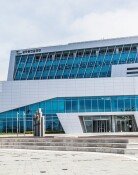Is NK Retreating From `Strong and Big Nation` Slogan?
Is NK Retreating From `Strong and Big Nation` Slogan?
Posted December. 30, 2009 01:16,
Building a strong and big country has been North Koreas core slogan used on its people over the past decade along with its military-first policy.
A decade ago, Pyongyang started proclaiming that it will open the door to a strong and big country by 2012. With two years to go until the target year, however, the slogan could turn hollow as the North is showing signs of retreating from its goal.
The core logic of building a strong and big nation was creating a strong economy. Coined in 1998, the term strong and big nation was defined by the North as encompassing political, ideological, military and economic power.
Pyongyang said that since it has become a political, ideological and military power, it needed only to raise its economy. Accordingly, the core of its policies was focused on building a powerful economy.
The term economic power is disappearing in North Korean media reports, however.
A classic example is Uriminjokggiri (only among our folks), North Koreas propaganda Web site geared toward other countries.
The site redefined a strong and big nation excluding economic power in the article, The Symbol of Juches (self-reliance) Socialist, Strong and Big Nation.
A strong and big nation does not mean a country with a large land area, high population, and a certain level of social life, but one that is strong and where all things prosper, and its people live without envying others, the article said.
North Korea said the most important power of a country is politico-ideological power, though military power is a critical part and economic power an important part.
The article said, A country where only a few people dominate national power and wealth and enjoy privileges and tremendous wealth is not a strong and big country.
Yet the North has recently stifled market activities that earned it hard currency through measures such as currency revaluation and tougher laws on real estate management.
North Korea has kept stressing economic development over the past decade, but has never clarified its goals. It instead prefers to use the abstract phrase a country where people live without envying others.
For this reason, even social scientists in the North are divided over whether they should compare the countrys economy with advanced ones abroad or use its own standards.
North Korea also said a country must prosper not only today, but also in the future. This means that the communist nation believes not being wealthy now is okay if prosperity comes later.
The North is more likely to claim to have achieved its goals in comparison to poor countries while maintaining its closed policy and limiting access to information, thus not objectively comparing itself with the outside world in economic power.
This has drawn suspicion over whether the North is trying to develop a new rationale to justify that it is a strong and big nation.
zsh75@donga.com
Headline News
- N. Korea launches cyberattacks on S. Korea's defense companies
- Major university hospital professors consider a day off each week
- Italy suffers from fiscal deficits from ‘Super Bonus’ scheme
- Inter Milan secures 20th Serie A title, surpassing AC Milan
- Ruling and opposition prioritize spending amid tax revenue shortfalls







